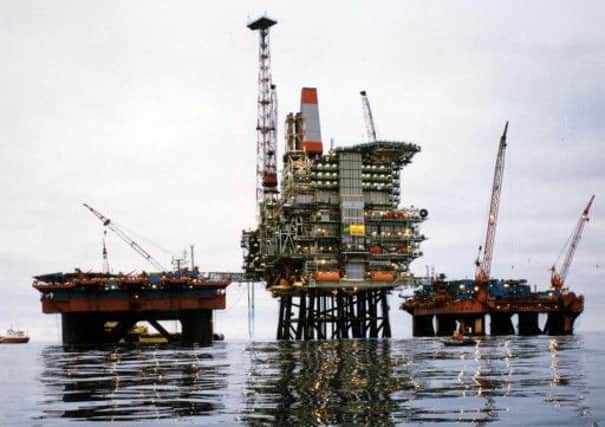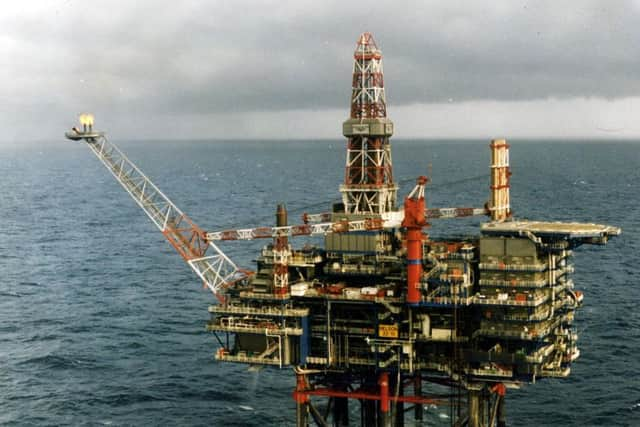Stephen Noon: independence key for Scotland’s oil


For decades, the Westminster economic orthodoxy has prioritised London and the South East and left the north of England behind. Figures from a range of respectable organisations confirm that the wealth and opportunity gap between north and south is massive and growing ever larger. This is bad news for Scotland, because an under-performing North West and North East of England means fewer cross-border opportunities for Scottish businesses. It is clearly in Scotland’s national interest to have a flourishing north of England and I’ve no doubt that an independent Scottish government - regardless of the political colour - would work to promote cross-border commerce and do what it could to boost the economy of the whole northern part of these isles.
I was on a BBC Radio Newcastle show recently and was amused to discover that No campaign politicians are telling the people of the North East of England that Scottish independence will be bad for them because jobs will flow out of the North East and into Scotland. Of course, simultaneously the No parties are telling the people of Scotland the opposite, that Scottish jobs will flood south.
Advertisement
Hide AdAdvertisement
Hide AdThere’s something quite appalling about the powerful in the Westminster system calling in aid the people of the North of England to try to stop independence. They talk about solidarity and pooling and sharing when the reality for decades has been the opposite, with a sharp relative decline for the north and west. That translates into fewer jobs, slower economic growth and the best opportunities created elsewhere, largely in London and south.


Devolution
Devolution has allowed Scotland to hold its own better than many other parts of the UK, but falling behind at a slower rate should never be acceptable, which is why we need to step up a gear with the new powers of independence.
Something has to change and Yes is the biggest opportunity - and currently the only opportunity - to bring about a much needed shake up in the way these isles are governed.
So, instead of solidarity as a platitude from No politicians, how about some substance - some solidarity in action?


It is ‘Scotland’s oil’ but that shouldn’t stop us from sharing part of the benefit from this windfall (and there will be plenty of benefit given the wholesale value of our remaining oil and gas reserves is some £1.5 trillion). And, the proposed Scottish Energy Fund gives us the vehicle.
But first, let’s be very clear. With oil production due to last until at least 2055, in the UK government’s own opinion, there will be plenty of opportunity for Scotland to save a portion of our energy wealth. To suggest otherwise is to fly in the face of the experience of the dozens of other nations (and even some regions) that have created sovereign wealth funds.
Oil fund
The UK may have failed to set up an oil fund but it stands almost alone among the world’s oil producers: the UK’s failure will not be repeated by an independent Scotland.
For the Norwegians, investment from their energy fund is made exclusively outside Norway and this is a good principle to follow. It means that, collectively, the people of Norway are now the biggest shareholders in Europe and have invested in a whole range of projects worldwide. Because we will be starting our energy fund later in the life of North Sea production, I would argue that Scottish governments should allow some investment in long-term projects within Scotland, in particular in our national infrastructure. However, that still leaves a lot of investment to direct elsewhere.
Advertisement
Hide AdAdvertisement
Hide AdAs part of this we should create a ‘solidarity component’ to our Energy Fund investment, which would see a proportion of Scotland’s offshore energy wealth invested in projects in the North of England, Northern Ireland and Wales to promote economic growth in those regions of the UK. This would be a very clear and practical way of signalling (and delivering on) an independent Scotland’s intention to use the powers of independence to rebalance the economy of these isles.
Transport links to north of England
In particular this solidarity component could be used to support investment in transport and communications links between Scotland and the north of England, bringing together a potential market, or economic region, of more than 7 million people. I would be a big supporter of a high speed rail connection linking Glasgow to Newcastle, for example. There could also be opportunities for ‘angel’ investment to support new business creation and to draw innovative companies to the border region. Over the years, we would be talking about multi-billion pounds of potential investment and support: support that delivers jobs and opportunities for the north of England, while also delivering a return for Scotland’s investment fund.
Solidarity also requires action at home and I would recommend a proposal put forward by the late Stephen Maxwell that we require Scotland’s energy fund to put 1 per cent of its annual revenue into a specific Communities Fund. This fund would build a base of assets over time with the return on this investment exclusively directed for the benefit of the most deprived communities in Scotland.
These communities would have a guaranteed income, separate from the vagaries of public spending rounds, which would enable local residents to develop a long term plan to regenerate their local economies. It would be an endowment for the most marginalised people in our country and one that would see our vast resources, finally, put to work for the benefit of the most disadvantaged in our society.
Saving the wealth and sharing the wealth - two things the Westminster system has abjectly failed to do. But with independence we can make these different and better choices for our future.
• Stephen Noon is Chief Strategist at Yes Scotland
• This article was supplied by Yes Scotland